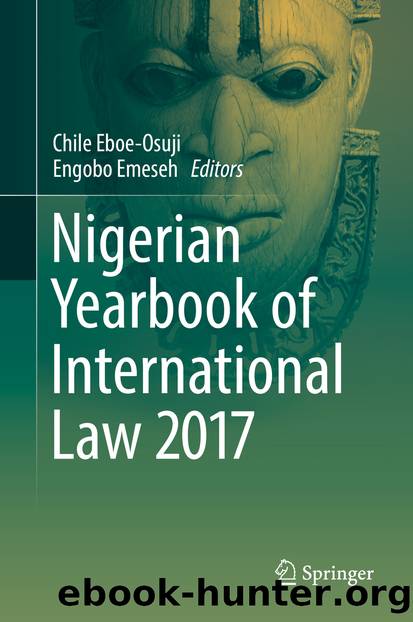Nigerian Yearbook of International Law 2017 by Chile Eboe-Osuji & Engobo Emeseh

Author:Chile Eboe-Osuji & Engobo Emeseh
Language: eng
Format: epub
Publisher: Springer International Publishing, Cham
10 Conclusion
The African Union’s conferment of criminal jurisdiction upon the AC might have provoked much anxiety, especially given the appearance of things—or indeed the probable reality—that the development occurred during a sustained period of hostile political wind, blown from Addis Ababa toward the ICC. But, beyond the politics, cold legal analysis reveals that there is much value in the development—barring the idea of automatic deferral of cases of senior State officials at the AC.
Proper analysis will reveal that the conferment of criminal jurisdiction to the AC is, as a general proposition, consistent with the idea of complementarity of jurisdictions between the ICC and States. The AC’s jurisdiction would still fall within that general compass of complementarity—and should override any danger of impunity even on the part of senior State officials. And beyond the question of automatic deferral of prosecution of senior State officials, the AC’s exercise of criminal jurisdiction affords an intermediate level of adjudication, which will process more of the cases that the ICC may lack the resources to tackle. Furthermore, the jurisdiction of the AC covers other areas of concern about serious criminal conducts in relation to which African leaders are entitled, in all good faith, to explore rule of law solutions. For instance, the Rome Statute does not cover treasonous usurpation of political power, corruption, mercenary activities and more over which the AC has now been conferred criminal jurisdiction. All these are criminal conducts that contribute to the retardation of economic development and quality of life on the African continent.
But the AC’s jurisdiction suffers from the legitimate criticism that it confers automatic deferral of cases against senior State officials. Then again, the idea of deferral of such cases is not unknown in the Rome Statute system. What is more problematic is the automaticity of the deferral at the AC. The better approach to realism is the calibrated manner in which the Rome Statute system sought to solve the problem of pursuit of accountability while still accommodating the need to avoid undue disruption of the governance of the State whose leaders are indicted at the ICC. This sticking point in the foreseeable complementarity of relationships between the ICC and the AC will, no doubt, be resolved in favour of the ICC regime, which is more consistent with international law on the matter. However, this difficulty (though highly regrettable) must not be permitted to overshadow all benefits that the extension of criminal jurisdiction to the AC promises to the continent and the broader international community in the fight against impunity.
Download
This site does not store any files on its server. We only index and link to content provided by other sites. Please contact the content providers to delete copyright contents if any and email us, we'll remove relevant links or contents immediately.
The Pirates of Somalia by Jay Bahadur(1627)
Political Theology by Carl Schmitt(1577)
The Holocaust: A New History by Laurence Rees(1521)
The Social Animal by David Brooks(1452)
A Practical Guide to International Arbitration in London by Hilary Heilbron(1434)
Restitution by Restitution(1424)
Pirates of Somalia by Jay Bahadur(1382)
Coercing Virtue by Robert H. Bork(1357)
The Nuremberg Interviews by Leon Goldensohn(1304)
Basic International Corporate Taxation by Sebastiano Garufi(1214)
A History Of Thailand by Baker Chris(1190)
International Trade and Business: Law, Policy and Ethics by Gabriël Moens & Peter Gillies(1150)
The Global Commons by Susan J. Buck(1137)
Asian Waters by Humphrey Hawksley(1114)
The Sovereignty of Human Rights by Macklem Patrick(1113)
Blood Profits by Vanessa Neumann(1113)
Spring Fever: The Illusion of Islamic Democracy by McCarthy Andrew C(1103)
The Nuremberg Trials: The Nazis and their Crimes Against Humanity by Roland Paul(1053)
Crimes Against Humanity: Historical Evolution and Contemporary Application by M. Cherif Bassiouni(1028)
